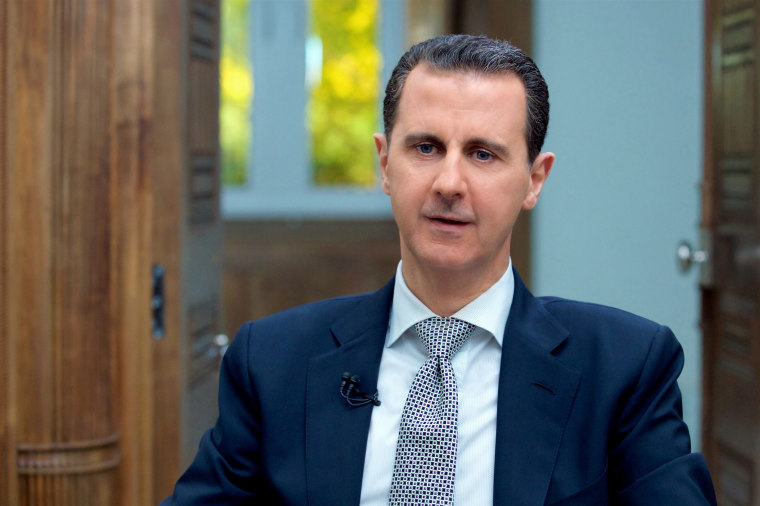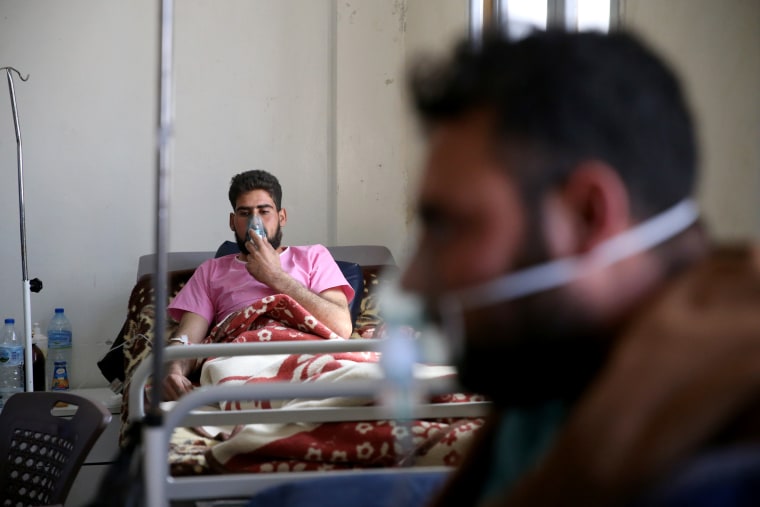As a chemical weapons expert, I know the psychological terror triggered by chemical weapons cannot be overstated. I myself experienced the palpable horror that troops feel during a deadly gas strike. ISIS fired 20 mortar shells, which landed about 500 meters from our position. As they hit the ground, there was no explosion, which seemed odd. But then we noticed the plumes of yellow-green smoke drifting downwind, plumes synonymous with chlorine.
It happened near Mosul last year. I was training Iraqi Kurdish Peshmerga forces on how to best respond to a gas barrage when ISIS attacked with chlorine mortar bombs. I watched as battle-toughened soldiers froze with fear.
Yet using chemical weapons in warfare is quietly becoming the new normal. In 2016, these noxious attacks equalled the amount of poisonous nerve gas used during World War I in 1916. Those attacks were deemed so catastrophic that they ultimately led to a worldwide ban. Now, the Syrian government, as well as ISIS, is using similar tactics.
Claims of sarin gas attacks arose often this summer. The fact that they have gone virtually unreported in U.S. newspapers shows how this most shocking of weapons apparently now fails to shock. Efforts to publicize the human rights crisis have been further hampered by Russia, which recently vetoed an attempt to extend a U.N. investigation into alleged chemical weapons use in Syria.
The international community is sending a dangerous message to despots, dictators and terrorists the world over: Stamping out chemical warfare is not a priority.
The international community is sending a dangerous message to despots, dictators and terrorists.
Indeed, gas attacks are becoming so commonplace that U.N. monitors are having serious problems keeping up. Even as word of alleged atrocities spreads on social media in real time, international agencies like the Organization for the Prohibition of Chemical Weapons, offer few answers.
Consider the deadly April 17 sarin gas attack on Khan Shaykhun, a Syrian rebel stronghold. Hundreds of civilians suffered chemical poisoning and approximately 90 died, chiefly women and children. Images of the devastating aftermath were widely shared on social media. The government of Bashar al-Assad quickly denied responsibility and Moscow, its key alley, has continued to support it.
Moving quicker than the international community, on April 7 President Donald Trump ordered a targeted missile strike on the Syrian airbase used, he said, by the aircraft that launched the nerve gas attack.
“Assad choked out the lives of helpless men, women and children," Trump stated later that week. "It was a slow and brutal death for so many. Even beautiful babies were cruelly murdered in this very barbaric attack.”

Even with Trump’s apparent backing, however, it took six months for the U.N.’s Organization for the Prohibition of Chemical Weapons (OPCW) to confirm Assad was responsible. The U.N. agency also took six months to confirm that Assad was responsible for similar nerve gas strikes in late March. Importantly, this time-lag helps perpetrators escape justice — by the time the actual culprits are named, the world has moved on to other atrocities.
Case in point: It took the OPCW a full 18 months to publish its report on an April 18, 2014 gas attack — though it relied on the same material I found soon after the strike.
The medical charity Union of Medical Care and Relief Organizations had asked me to investigate an alleged gas attack in Talmenes, a town in northern Syria. I ran soil tests that revealed “sizeable and unambiguous traces of chlorine and ammonia” and issued a statement at that time. In contrast, the OPCW’s report seemed to be delayed at every turn. (Granted, Syrian President Bashar al-Assad’s fierce resistance to any investigation was a big hindrance.)
The Syrian regime is also alleged to have used chemical weapons during last year’s attack on the city of Aleppo. Syrian and Russian air strikes were deadly, but chemical attacks were terrifying. The citizens could hide from bombs, doctors working in Aleppo told me, but they felt helpless when it came to poison gas.
One of the worst attacks in recent memory took place on August 21, 2013, when close to 1,500 people were killed in the Syrian city of East Ghouta. The victims succumbed to sarin gas, according to Human Rights Watch, which also blamed Assad for ordering the strike.
We cannot wait for a chemical attack on New York or London or Paris — or even Moscow — to act.
ISIS leaders have also adopted the use of chemical weapons while defending strongholds like Mosul and Raqqa. The terrorists typically rely on easily available toxic industrial chemicals, like chlorine and organophosphates (pesticides). ISIS forces are also suspected of manufacturing cheap mustard gas. We should assume terrorists around the world are watching these developments with great interest.
Making matters worse, extremists trained in the use of chemical weapons in Syria and Iraq could soon migrant to Great Britain, the United States and Europe. There have already been instances of improvised chemical weapon use in Australia and Indonesia.
When Trump bombed the Syrian airbase soon after the Khan Sheikun chemical weapons attack, I wondered if we had reached a turning point. But so far, little has happened to build off that momentum.
We cannot wait for a chemical attack on New York or London or Paris — or even Moscow — to act. After the horrors of World War I, the international community banned the use of chemical weapons for nine decades. In light of the past decade, however, I fear we may no longer be as determined to prevent Armageddon.
A former commanding officer in the British Army, Hamish de Bretton-Gordon has worked with both British and NATO Chemical Biological Radiological & Nuclear battalions. He is currently the Managing Director at Avon Protection and the director of the NGO "Doctors Under Fire."
